“Use your imagination to dream up a horrible road story about a barely human troupe of tripping Texas lunatics limping across a defenceless pre-EU Europe, never more than an inch away from incarceration—then multiply it by about 10,000. You will still not even be close to approaching a shadowy semblance of what it was like to sleep beside these four drug-crazed, gin-soaked psychopaths for six full months.”
That’s what I was told a few years ago when I interviewed Mark Kramer—the Bongwater musician, Shimmy-Disc founder and producer of artists such as Galaxie 500, Low, Daniel Johnston and Will Oldham—about his stint as a touring member of Butthole Surfers.
Videos by VICE
“They sprinkled LSD on their cornflakes every morning,” he continued, “which was then washed down with Johnny Walker Red. Beer for lunch, lowly Mexican dirt-weed smoked in bone-dry bongs for dinner, and then two hours of coughing fits and another bowl of LSD an hour before showtime.”
It’s the sort of tour itinerary that would have Mumford & Sons waking up in the middle of the night drenched in a cold sweat, with tears of fear slowly rolling out the corner of their eyes as they fumble around in the dark of their hotel room to make sure the fridge full of Perrier is still there. It’s also an image you don’t have to look very far to have reinforced. Anybody that has burned through Michael Azzerad’s Our Band Could be Your Life will have read about similar acid-fuelled, hell-raising tales, and even a cursory search of Butthole Surfers online will quickly lead you to videos of their lead singer, Gibby Haynes, looking like a caveman who has been transplanted from the dark ages as he rambles incoherently about worms with the mania and malevolent glare of a guy you would most likely cross the street to avoid if you saw him coming.
Basically, to anyone unaware of their legacy, Butthole Surfers—along with bands like Scratch Acid, Big Black, and Flipper—fused noise with punk in a way that would become the main catalyst of inspiration for grunge. But, in ways unlike anybody else at the time, or since, their legend is equally defined by the fact that they were purposefully and aggravatingly the weirdest motherfuckers on earth.
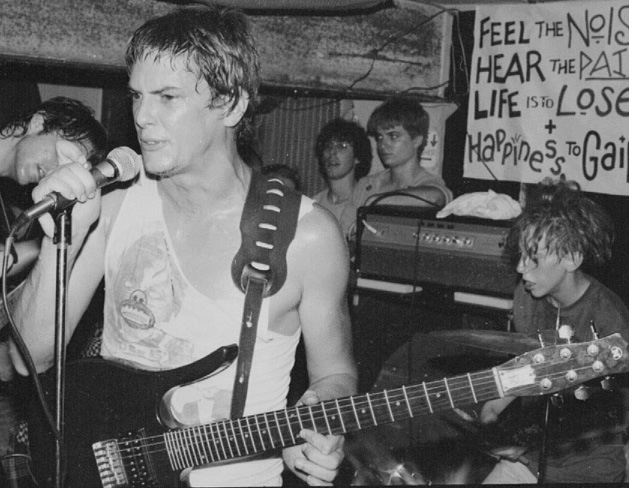
Photography by Dixon Edge Coulbourn
Founded in San Antonio, Texas in 1981, the band freaked out from the word go. The Butthole Surfers revelled in mayhem, purred in mischief, and drank themselves to hell, often to the point of being unable to function or perform. However, rather antithetically to their drink and drug-crazed reputation, before the world of the Butthole Surfers existed, Haynes was on a fast-track route to being a successful accountant, and guitarist Paul Leary was inches away from a masters degree in business administration. As a band they were lurid, surreal and outlandish, genuinely terrifying to some, but it was not without due thought. It takes a degree of intellect to behave that stupidly.
Their first three albums Psychic… Powerless… Another Man’s Sac, Rembrandt Pussyhorse and Locust Abortion Technician are all juggernaut releases. From tongue-in-cheek nods to Black Sabbath to the pulled-to-bits cover of “American Woman,” these are tracks that switch in tempo from slow creeping terrors to wild sweat-inducing abandon, and nightmarish narratives woven with puerile and obtuse wordplay. They were a band singular in character, but impossible to define sonically. Operating as some sort of mutant punk rock, psychedelic, esoteric noise, post-punk hybrid outfit, they wriggled around like snakes smothered in lube when it came to letting a genre stick to them. Perhaps this is the reason why, 35 years on from their formation, they still sound like no-one else.
It was a sonic quality that Kurt Cobain certainly picked up on. He was a big fan of the band, and exchanged digits for the first time with Courtney Love at a Butthole Surfers show when they were supporting L7. He even went on to list two of their albums in his top 50 all time favorite records. Like a great number of the bands on that list—such as The Vaselines, Daniel Johnston, Pixies, and Beat Happening—they were a truly underground group that not only influenced Cobain, but would also go on to benefit enormously by association when Nirvana exploded and draped whole chunks of America in plaid, and every A&R executive started throwing cheques at anybody with a guitar and a drug problem, looking to bag the next Pearl Jam.
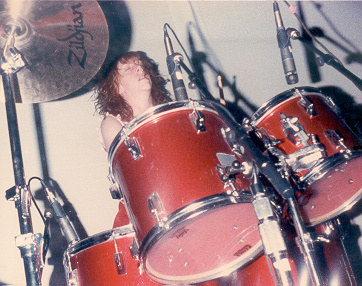
Photography by Greg Hubbard
Writer James Burns has attempted to capture the topsy-turvy world of the band in a new book just released, Let’s Go To Hell: Scattered Memories of the Butthole Surfers. He, along with Buttholes Surfers founding member Paul Leary, met up with me to discuss, in equally scattered terms, the book and the band’s history. Burns starts by describing his initial exposure to them and what set off a life-long love affair. “I was a 13 year-old straight edge punk rock kid when I first heard [The Butthole Surfers],” he says, “I was so confused, I didn’t know what to think. I heard ‘The Shah Sleeps in Lee Harvey’s Grave’ and it was so completely far removed from anything I knew about at the time. It was a bit of an affront to my punk rock sensibilities, where every band had to have a cause. It wasn’t until I saw them in concert for the first time in 1987 that I understood that one didn’t need to be a political band to be political.”
Butthole Surfers’ live shows—particularly those in the 1980s—are the stuff of monstrous myth and grotesque legend, involving everything from burger-stuffed mannequins to fist fights, fires, dye-filled condoms, nudity, and even supposedly full-on onstage sex once. All of this took place while layered and lysergic projections would show images of graphic medical procedures on the back wall—a fascination Leary and Haynes picked up early on, as demonstrated through their own ailment fanzine Strange VD. It wasn’t quite performance art, but very much about the art of performance, and had more in common with the shock shows of 60s Parisian surrealists than your average rock gig.
Burns recalls his first experience of seeing the band in 1987, in which Haynes filled the room with almost dangerous levels of dry ice from a smoke machine. “There was this tightrope between entertainment and sheer terror that existed. Very few bands had that kind of power to have you, quite justifiably, fear for your own safety.”
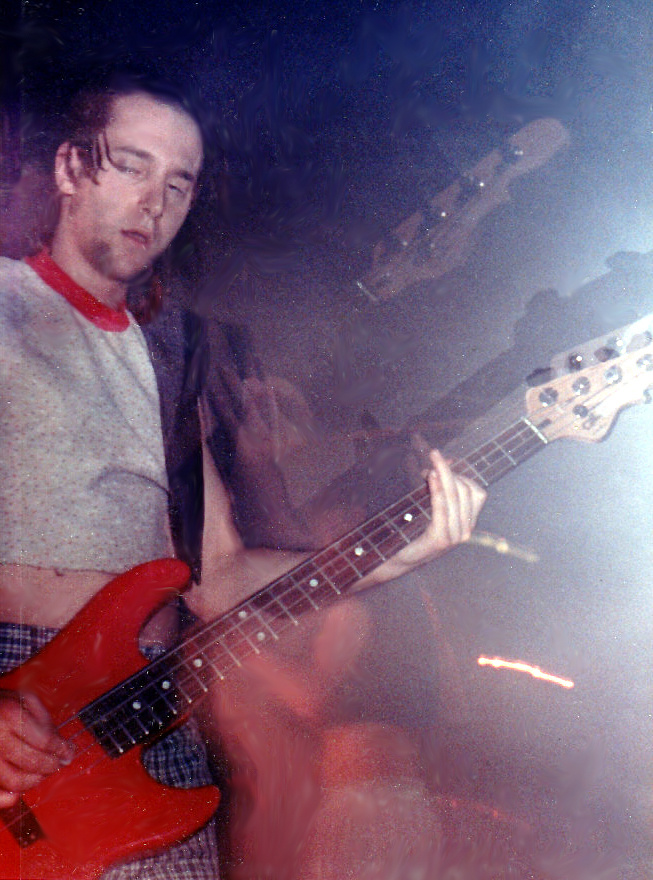
Photography by William McConnell
It’s difficult to envision the music festival ATP having a ‘no assholes policy’ these days that doesn’t just consist of their own name smeared in faeces on a sheet of A4, but there was a time when they banned several acts from playing their festival due to inappropriate behaviour. Butthole Surfers was one of them. “Gibby went to the cafeteria for lunch and passed out at a table,” Leary explains. “A security guard woke him up and told him to leave, and that started the incident. I pity the fool that has to wake Gibby up. Barry Hogan [the ATP organiser] came to the scene and things calmed down. King Coffey [the drummer] and I both apologised profusely to Barry. He was cool about it at the time. Later, in an interview, he said ‘Killing Joke and the Butthole Surfers will never play ATP again, and they can both suck my balls. And you can put that in print’.”
A couple of years later, Leary received an email from the band’s agent saying Barry had contacted him about Butthole Surfers playing another event. In turn, Leary responded with the clip of the interview and told their agent to ask Barry if he still wanted them to suck his balls. “I got a personal email from Barry with an apology for what he had said,” Leary says, “Our ban from playing ATP was short-lived.”
But Butthole Surfers’ distinct lack of boundaries, on every conceivable level, would leave chemtrails of controversy in their wake wherever they went. At one show in 1987, the band, despite their reputation, were inexplicably booked to play an all ages early doors concert. This was also around the time they had Kathleen Lynch in the band, a naked dancer that stemmed from the Atlanta, Georgia scene, where she would cross paths with the likes of RuPaul in the performance art/dancing world.
Despite assurances of no nudity for this particular show, Lynch’s breasts were soon out, as was Leary’s penis (which he swung around manically). Kids were screaming and crying, and parents that brought their children were incensed as Hayes purportedly howled things from the stage such as “Don’t you hate it when your dad walks in and you have a wine bottle up your ass?” But it wasn’t until Haynes literally set himself on fire that the plug got pulled by the frantic venue owner. Chaos continued as Haynes threw alcohol on bouncers or anyone else that tried to stop him or get in his path, clutching a lighter in the other hand ready to ignite them in a snap. All the while, the roof was slowly smouldering from every cymbal-thwack (covered in rubbing alcohol) that sent more flames shooting across the room. Fire extinguishers came out as people stormed the stage to stop the band, the venue kicked everyone out, and riots and theft of equipment ensued as the mayhem spilled out into the street.
But their behavior was sometimes met with equal aggression. One early drummer for the band never made it past his first show after getting a beer bottle straight to the face mid-gig. “I can think of one reaction that was so extreme I cannot bring myself to say what it was,” Leary says, following up with a question: “Are people reacting to our music, or are they reacting to the same thing that our music is reacting to?”
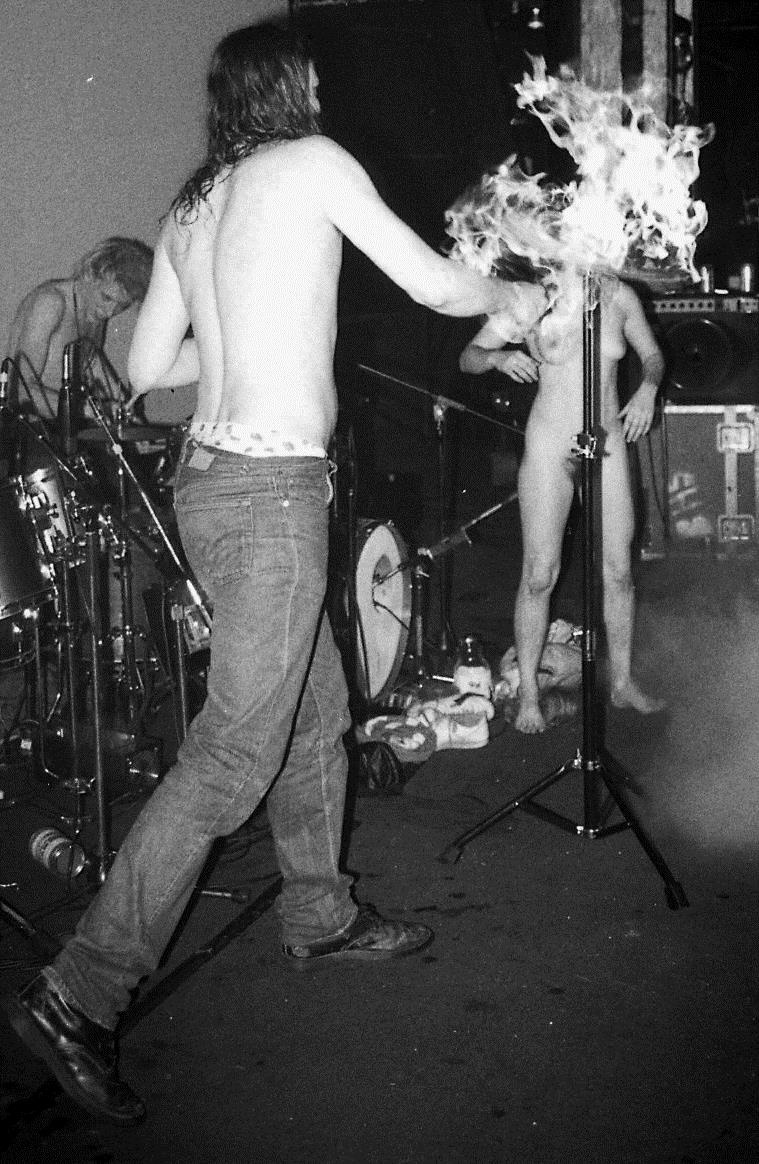
Photography by Ken Salerno
In essence, the band are rooted in the familiar punk-driven ethos of being anti-establishment and anti-conformity, but deliver it with a sense of humor and preposterousness so black it turns into its own vortex. Theirs is a reaction of subversion through the sheer exhilaration of pushing a moment, musical or otherwise, to a state of absolute terror and potential collapse; of letting go and seeing where the chaos they’ve created will take them. It’s an almost conceptual way of existing, and one I don’t think any medical or psychological professional would advise when applied outside of the stage. It takes the endurance and gall of at least ten Hunter S. Thompsons to sustain that kind of lifestyle.
“Sometimes it’s hard for me to even think of our music as music,” explains Leary. “I’ve been playing guitar since ’63, but I’ve never been a good musician. We aren’t good musicians. It has been more of a platform to express ourselves, even though we don’t know what we are trying to express. I was pretty mad at the world for a while.”
Burns claims the group often denies their own abilities and impact. “They downplay their talents, their influence, and the affect it had on many people,” he says. “This is sort of the reason I thought the book was necessary. They were way more important than many people—maybe most of all themselves—believe them to be.” Whilst it’s certainly unlikely you’ll find a Butthole Surfers doll or mug at your local HMV anytime soon, the band played a significant role in the underground alt-rock scene that led to the gargantuan explosion of the 90s. Although Leary, of course, plays this down: “As far as credit, I think everything is just fine. We are not Nirvana. We are not very likeable on a large scale. That is just how it is. We weren’t exactly bending over backwards to be liked.”
That said, in the wake of said grunge explosion, Butthole Surfers, like many others, suddenly found themselves on a major label, with a hit record, and a large, freshly-captivated MTV audience. So keen were record labels and A&R people to snap up alternative bands that could potentially be the next Nirvana, that It created a strange bubble in which only five years earlier, the idea of groups like Butthole Surfers and the Jesus Lizard being on Capitol Records would have seemed so ludicrous that it wouldn’t even warrant comprehension as a joke.
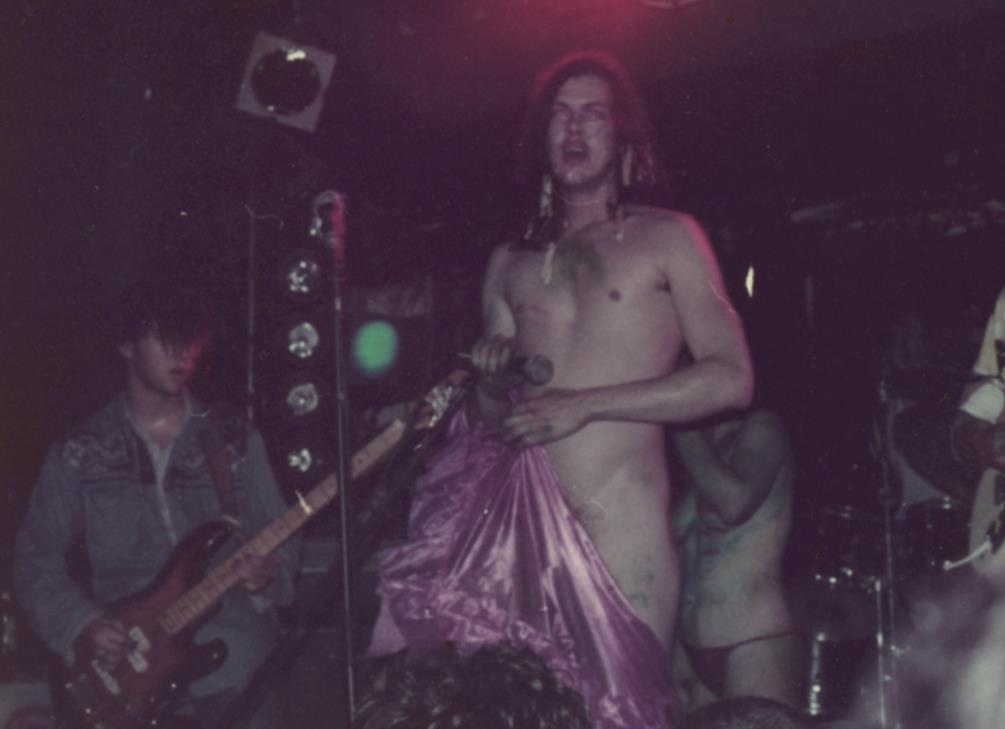
Photography by Chris Schneider
However, it happened and it catapulted the band from being a word-of-mouth underground success, travelling the US in crappy vans that coughed exhaust fumes straight into the cab, into working with Led Zepplin’s John Paul Jones, seeing their albums and singles slowly climb the Billboard charts and tracks start to appear in films and television programmes like Romeo & Juliet, Beavis & Butthead and John Carpenter’s Escape From L.A. The group’s newfound popularity and platform even meant a celebrity side-project for Haynes via P, a project with Johnny Depp. P were playing, with Flea on bass, at The Viper Room the infamous evening that River Phoenix passed away.
“I remember the band being summoned to Gary Gersh’s office to celebrate our album going gold,” says Leary, recalling the period with both fondness and mild derision. “There were a lot of people milling about in there and I thought it was stupid. Then Gary comes up to me and says, ‘Hi, I’m Gary Gersh. I just want you to know that I really respect what you do.’ That made me feel pretty good, coming from the president of Capitol. About five minutes later, he comes up to me again and says, ‘Hi, I’m Gary Gersh. I just want you to know that I really respect what you do.’ That kind of summed things up for me. Being on a major label was a lot more fun for us than it was for them, until they had their fill of us. Then it wasn’t fun any more.” Their move to Capitol eventually culminated in the band filing a lawsuit in order to acquire the rights to their back catalogue, although Leary is reluctant to speak about it in depth.
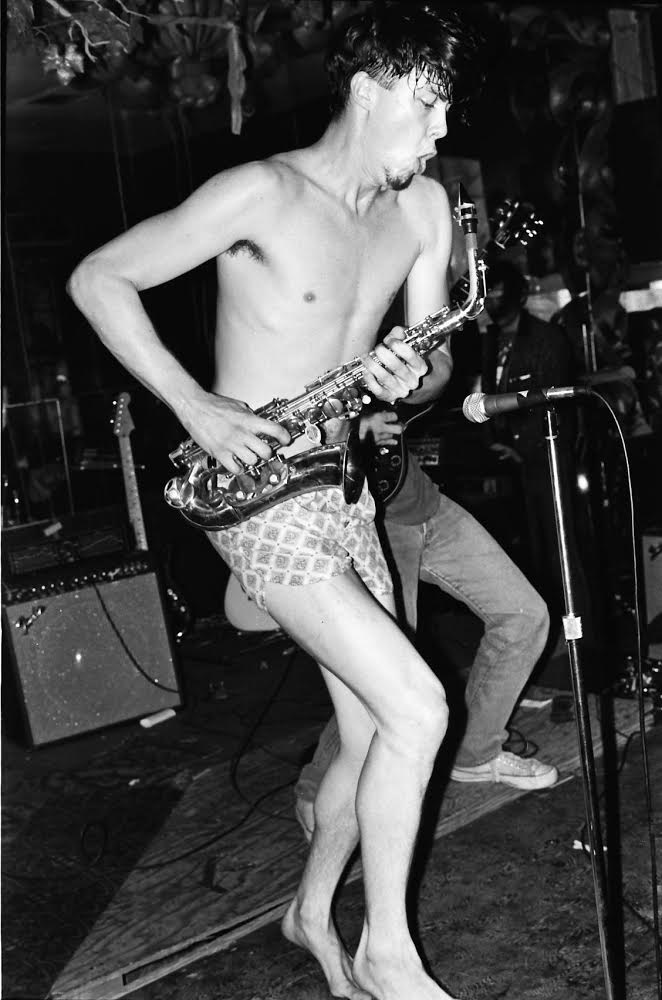
Photography by Edward Colver
Looking back on their considerable history, and discussing the story of the band, Leary and I end up speaking about the comedian Garry Shandling, who passed away in March this year. He naturally comes up in conversation, given the band’s legendary appearance on The Larry Sanders Show (co-created by Shandling) in 1997. “I remember the band was hanging with him and Rip Torn on set. Rip told Gary, ‘These guys have a song where they say ‘Gary Shandling’ over and over again. You should hear it!’ And Gary replied ‘Do I have to?’ They were very nice to us. Although they were apprehensive about us setting their stage on fire… which we did.”
If the Butthole Surfers have one defining TV gold moment, though, it has to be their reference on The Simpsons in which Todd Flanders ends up in a hand-me-down Butthole Surfers t-shirt as he exclaims, “Look Daddy, I’m a surfer”. It was a big moment for the band. “That is definitely for me one of the two ultimate highlights of our career,” says Leary, “That and playing the Ed Sullivan Theater for David Letterman.”
The past few years have seen scattered activity from the band—compilations and reissues, a Gibby Haynes solo album in 2004, a new project from Leary formed in 2005 called Carny, Haynes producing Lemonheads’ last record Varshons, and Leary contributing tracks to Melvin’s 2014 album Hold It In—but it’s been 15 years since there was a Butthole Surfers record, and live shows are becoming increasingly rare occurrences. I guess when your performances are carnivals of lunacy—vomit-inducing, freak fests that would molest the senses and often send people screaming towards the exits, either from the screeching fury of the musical tornado on display or the sort of kidnap dungeon environment the band would create in the room—then you can’t just keep touring that shit into your grey years like the unremitting tours of KISS or Iron Maiden.
“I am hoping to record a new album this summer,” says a reflectful Leary. “It is something that I have wanted to do for years now, but have just been too busy to get it off the ground. I have no idea what it will sound like. As far as touring goes, I’m pretty much done with that. For now.” All that stuff is now just legend.
You can follow Daniel Dylan Wray on Twitter.
Mere
fra VICE
-

American rock band Garbage. (Photo via Paul Bergen / Getty Images) -

(Photo by Tom O'Connor/NBAE via Getty Images) -

Amr Bo Shanab/Getty Images -

Screenshot: NetEase Games
